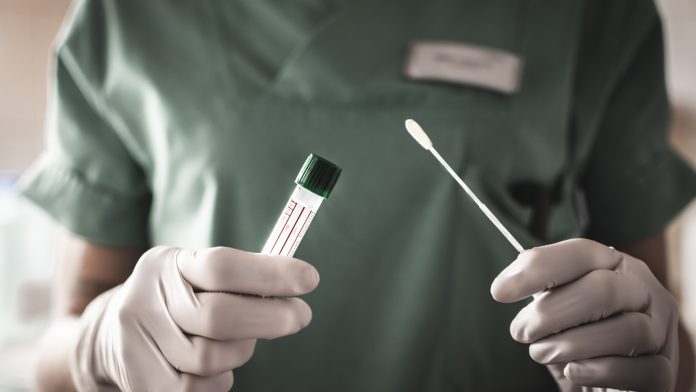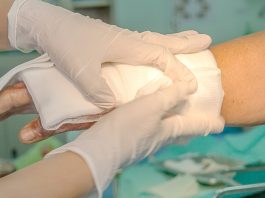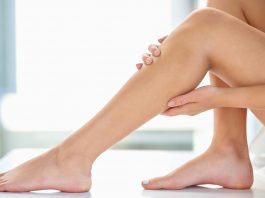CUTISS’ CEO, Dr Daniela Marino, explains the challenges facing bioengineering during the pandemic and how the company cope during a time of global uncertainty.
Skin is the largest organ of the human body, composed mainly by an outer epidermis and an inner dermis. It is our interface to the outer world, and its total loss is incompatible with life. In contrast to small skin lesion, if large proportions of epidermis and dermis are lost, the resulting full-thickness defects (FTSD) represent a significant, and sometimes unsolvable, problem for surgeons. The classical conditions that often lead to extended full thickness skin loss are burns, avulsion injuries, septic skin necroses, and iatrogenic skin defects.1 For many, tissue therapy is the only solution.
Today, FTSD are treated by means of skin autografting: a split-thickness skin graft (STSG) is harvested from a healthy donor site of the patient’s body and transplanted on the full-thickness wound. STSG, being composed of epidermis but only remnants of dermis, are thinner than the wounds, thus, after transplantation, scar tissue is deposited to fill up ‘the gap’ and contraction is promoted to try and reduce the wound volume.
Clearly, during the acute phase, donor site shortage represents an unmet need that can even be lethal. In mid- to long-term, scarring becomes a major issue. Scars are indeed not just disfiguring but also debilitating and highly discomforting, they can also be painful and can impair mobility and growth and require corrective surgeries, intense homecare, and psychosocial rehabilitation.1
CUTISS develop personalised bioengineering dermo-epidermal skin grafts, offering a solution to the lack of permanent skin coverage. In this article CUTISS’ CEO, Dr Daniela Marino, discusses the role of bioengineering during the pandemic.
COVID-19 pandemic – challenges and opportunities
The COVID-19 pandemic was a cold shower. CUTISS was on a scale up tour and we were planning our largest financing round to date. Everything had gone well, and we were all very positive. Many trips were planned to meet investors, our new GMP facility was coming to life, our trials were being accepted by the AIFA in Italy, and we were hiring new staff. But then, like so many others, we found ourselves at home, with children to entertain and home-school. All trips were cancelled, all hiring processes frozen, clinical trials placed on standby, and Italy was in chaos. No one in the company knew what to expect, how long the lockdown would last, whether we should we apply for state support, or how to best protect our employees and ourselves.
The management team had to meet online on a regular basis to take decisions based on the evolution of the situation and on the guidelines issued by the Swiss Government. Our lab remained open; we provided masks and disinfectants; we used e-mobility solutions to avoid public transport; and we had people working in shifts and maintaining social distance. Home office was strongly encouraged and social distancing, even in private settings, was recommended.
We continued to move forwards but at a dramatically reduced pace and we are now emerging from the other side with only a few bruises. Our fundraising activities have moved up a gear and the international scenario, filled with Asian and US investors, has had to re-dimension itself. Our largest existing investor took the lead in supporting the fundraising, and the management team re-budgeted the needs to eventually be ready for a low cash situation.
The Swiss ecosystem supported us in an incredible way, and we were able to close our Round B with 20 million CHF in seven weeks, during a global pandemic, with Swiss private and family offices. This is an astounding success; we are proud of what we achieved, and are now committed to going straight to success.
The Solution
denovoSkin™ is a personalised bioengineering dermo-epidermal skin graft which offers a solution to the lack of permanent skin coverage. It is an Advanced Therapy Medicinal Product (ATMP) developed at CUTISS and is made of cells isolated from a stamp-sized patient’s split-thickness biopsy. It is comprised of both an epidermal and a dermal component. As such, there is no rejection issue after transplantation and the product is safe.
Currently, denovoSkin is manufactured with a classical manual procedure where cells are isolated, amplified in 2D, and then combined into a skin-like graft using a collagen hydrogel scaffold in 3D. The hydrogel is plastically compressed to ensure mechanical stability and user friendliness (surgeons are used to applying skin on wounds by means of sutures, staples, glues etc.). However, CUTISS’ Research and Development team is working full speed on the scale-up and automation of the manufacturing process supported by an EU H2020 SME Instrument grant, an EU H2020 SME Innovation Associate grant, and a Swiss Innosuisse Grant. Two major Swiss engineering companies are involved: Zühlke engineering, and CSEM.
The ultimate goal is to position denovoSkin as the first-in-class automated-produced tissue therapy that can treat children and adults in a safe, effective, and accessible way. The automation programme focuses on three main automated modules:
- Cell isolation;
- Cell expansion; and
- Tissue formation.
Each module will replace the corresponding manual process.
In a second step, the three modules will then be integrated to create an automated production line. The production of skin tissue here has several advantages. Amongst others, these include:
- Robustness;
- Consistency;
- Reproducibility;
- Safety;
- Shorter production time; and
- Smaller costs.
The standard of care today follows no specific guidelines when large, deep wounds are to be permanently treated. The healthy skin remaining on the patient’s body is the only means of real coverage and it is therefore harvested thinly (split thickness skin graft, STSG), and meshed, repeatedly. This means that the donor site is also wounded and very often patients suffer sever donor site morbidity.
Unfortunately, donor site shortage is a clear unmet clinical need for large and deep skin defects. A few options are available to surgeons, such as reCell®, keratinocyte sheets, and dermal templates, but all of these are applied on meshed STSG.
denovoSkin, with its permanent, dermo-epidermal structure, has the potential to bring new standards in skin grafting. With the use of denovoSkin, surgeons could avoid the re-harvesting and meshing of STSG; the healthy donor site could be optimally used; and the aesthetic outcome would be superior, as would functionality. Importantly, after the burn acute phase, denovoSkin could be very beneficial to burn survivors who need or want to correct their scars. Other kinds of elective/reconstructive indications (tumour resections, plastic surgery, etc.) may also benefit from our technology.
The clinical trials status
denovoSkin has received Orphan Drug Designation for the treatment of Burns by Swissmedic, the EMA, and the FDA. It is now in Phase II efficacy trials in Europe (NCT03227146, NCT03229564, NCT03394612). denovoSkin is a safe product, and the success of the efficacy trials is now directly dependent on patients’ willingness to participate in the study.
After a necessary pause due to COVID-19, we are again actively recruiting in Switzerland, the Netherlands, and Italy (the AIFA approval was granted in February 2020, but due to COVID-19 the activities were postponed) for a phase IIb efficacy trial.
We are able to recruit paediatric and adult patients with acute burns, but also those with a need for elective skin grafting (scar reconstruction, tumours, nevi, plastic surgery, etc.). Importantly, Burn Compassionate Patients admitted at European or Swiss Hospitals may also be grafted with denovoSkin.
Financial history
CUTISS is a spin-off of the University of Zurich (UZH), and was incorporated in March 2017. After completion of the Safety Phase I trials funded by the FP7 EU programme in October 2016, the start-up incubator Wyss Zurich (see: www.wysszurich.uzh.ch/projects/wyss-zurich-projects/denovoskin) decided to financially support the Phase II trials for denovoSkin. In July 2017, soon after incorporation, the newly-funded UZH Life Science Fund, a joint venture of UZH Foundation and Novartis Venture Fund, injected a seed round of 1 million CHF to launch the automated production of denovoSkin.
In May 2018, CUTISS Ltd, with a team of six people, closed a Series A with over 11 million CHF (lead investor, Giammaria Giuliani, from Giuliani Pharma) and received grants for €4m. As of today, CUTISS’ team is composed of 23 people involved in R&D, automation, production, and clinical trials – a very strong, experienced team that works in close co-operation with clinical, regulatory, and engineering partners.
CUTISS has its own R&D labs and is building its own GMP facility to scale up manufacturing at the Biotechnopark in Zurich-Schlieren. A Series B financing round was closed in June 2020 with 20 million CHF via existing and new investors (family offices and private individuals). This further injection is will be used to support activities up to mid-2022.
References
- Marino D., Reichmann E., Meuli M. ‘Skingineering’. Eur J Pediatr Surg. 2014 Jun;24(3):205-13. doi: 10.1055/s-0034-1376315. Epub 2014 Jun 11
Dr Daniela Marino
CEO
CUTISS AG
+41 76 230 8046
daniela.marino@cutiss.swiss
www.cutiss.swiss
Please note, this article will also appear in the third edition of our new quarterly publication.









